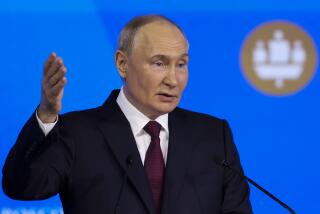Another Salvo From Yeltsin’s Arsenal of Surprises Pummels Aides
- Share via
MOSCOW — President Boris N. Yeltsin’s latest surprise announcements on Russia’s disarmament plans, made on his current state visit to Sweden, have once again bewildered the West and exasperated aides trying to persuade the increasingly eccentric leader to keep to an official script.
His spokesman, Sergei V. Yastrzhembsky, tactfully downplayed Yeltsin’s first startling gesture Tuesday night--a promise to cut Russia’s nuclear warheads by one-third and seek a total world ban on atomic weaponry--by hastily explaining that the Russian leader was “tired” after a long day and that he had done no more than shed some light on talks underway with the United States.
But, first thing Wednesday morning, Yeltsin, 66, resumed his ways, this time with a second dramatic promise, to the Swedish parliament, to unilaterally cut Moscow’s ground and naval forces--”especially in northwestern Russia”--by at least 40% beginning Jan. 1, 1999. “Listen to this, and evaluate it,” he exhorted, looking up with a sudden grin from his text. His audience--confused lawmakers and an anxious Yastrzhembsky--answered with silence.
Later, Yastrzhembsky issued his gloss on the presidential offer. The huge cuts Yeltsin had talked of were only the same armed forces personnel cuts that Russia has planned for years, he said. “The reduction will fall within the limits that have been announced,” he said.
Yeltsin, a natural showman with an affinity for alcohol, has caught many off guard in the past with his boisterousness at public appearances.
He returned to work last spring after a year of serious health problems, including quintuple heart bypass surgery last year and a bad winter bout of pneumonia. During his illnesses, analysts expressed concern about his frail, shaky appearance and slurred speech.
On his recent trips abroad, he has made it his practice to present his host with a colorful political gift in the shape of some startling new concession.
Most famous of the gestures was his May announcement, at a NATO summit in Paris, that Russia would remove nuclear warheads from its missiles. The Kremlin was swift to explain that what the president had really meant was that the missiles would no longer be aimed at members of the North Atlantic Treaty Organization.
While these presidential remarks often turn out to have little substance, they have come to be a recurring headache for staff atop Russia’s hierarchical power structures. To criticize or contradict the boss is unthinkable in Russia; the only way out for Yeltsin’s advisors is to “reinterpret” the president’s wayward words.
Yastrzhembsky, a quick-thinking career diplomat who became the president’s spokesman last year, was recently described in the authoritative newsmagazine Itogi as needing “the ability to make instant sense of Yeltsin’s not always very successful improvisations, and getting his own interpretation over to the press just as fast.”
Anxiety over what to say about the Russian president’s latest generous words was palpable in Moscow’s corridors of power Wednesday. “The Stockholm statement caused turmoil at the Foreign Ministry, and no diplomats would agree to comment on it,” the respected daily Izvestia noted wryly. “Staff of the ministry’s security and disarmament department are in a state of complete bewilderment and consternation. They all said they had absolutely nothing to add to Sergei Yastrzhembsky’s words.”
Post-Soviet Russia is already working both on scaling down its aging nuclear weapons arsenal and on reductions in its unwieldy armed forces. Under the START II treaty with Washington, signed in 1993 but still to be ratified by the Russian parliament, the United States and Russia agreed to cut their long-range nuclear warheads.
At a March summit in Helsinki, Finland, Yeltsin and President Clinton agreed to begin work on a START III treaty.
Nongovernment analysts in Russia were scathing about the president’s intentions, suggesting that he was in essence using sleight of hand to palm off pre-accepted policy as a surprise gift. Military analyst Pavel Felgengauer, a columnist at the daily Sevodnya, said: “The president has rightly decided to make a virtue out of necessity.”
More to Read
Sign up for Essential California
The most important California stories and recommendations in your inbox every morning.
You may occasionally receive promotional content from the Los Angeles Times.










